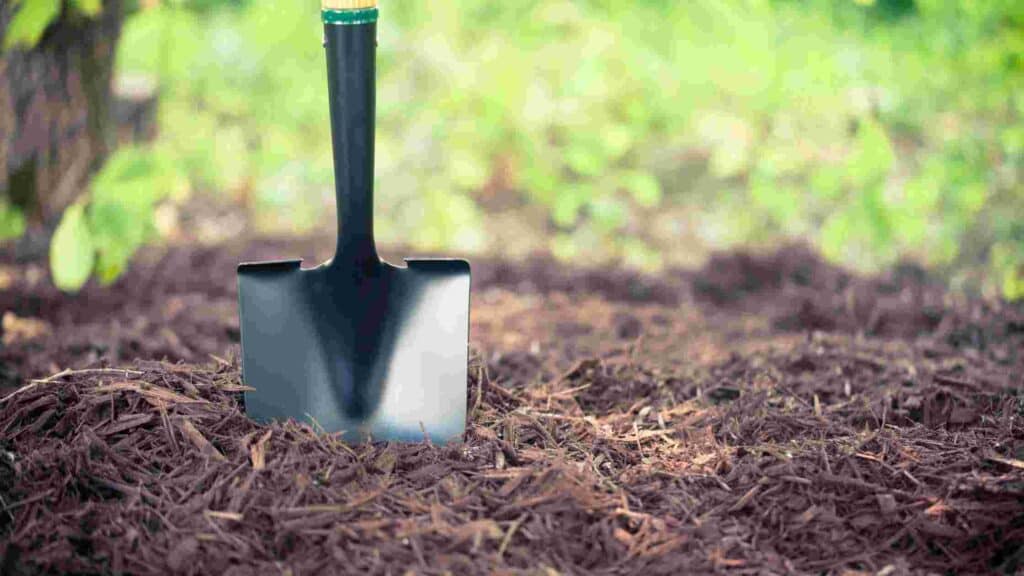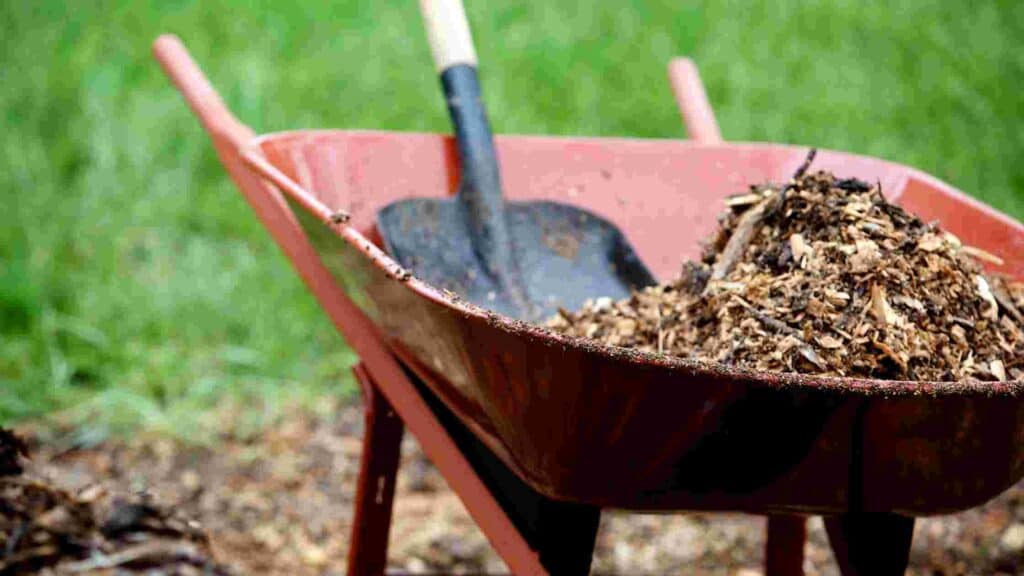In every gardener’s journey, the inevitable question arises: What to do with old mulch?
As time passes, mulch breaks down and loses its effectiveness, leading many to wonder how to best handle the remnants of this essential garden material.
Whether you’re looking to rejuvenate your garden beds or recycle the old mulch this guide will provide you with valuable insights on making the most of your aging mulch while maintaining a thriving and sustainable garden space.
What To Do With Old Mulch?
So, what to do with old mulch in the garden instead of tossing it away?
Before planting season arrives, gently rake the mulch to one side, giving your garden bed some breathing space. Then, generously sprinkle compost on the bed and mix it into the soil.
Once that’s done, return the old mulch to its original spot, and if needed, add some fresh mulch to complete the ensemble.
What Is Mulch Used For?

Alright, let’s start with the basics. Mulch is like a cozy blanket for your precious plants, keeping the soil moist and protecting their roots from extreme temperatures, be it the scorching heat or the chilling cold.
Not only that but mulching also has an added bonus—it helps to fend off those weeds that love to invade your garden sanctuary (recommended reading: what is mulch?).
Organic And Inorganic Mulch
So, what exactly goes into making this garden protector?
Organic mulch, for instance, is the good stuff that enriches your soil as it decomposes over time. Think bark, compost, shredded leaves, grass clippings, newspaper (yup, even your old daily read can be useful), straw, and hay.
Inorganic mulch, on the other hand, consists of stones, gravel, and black plastic—that don’t break down but get the job done.
Does Old Mulch Need To Be Removed?
You’ve got your mulch laid out, and time goes by—what then?
Well, if your mulch is still holding its form after a year, you need not get rid of it.
Give it a little test—pick some up; if it still looks and feels like mulch, it’s good to go. However, if it has crumbled into fine particles resembling dirt, it might be time to swap it out or work it into the soil as compost.
The Advantages Of Keeping Old Mulch
Keeping your old mulch continues to break down, feeding your plants with essential nutrients and organic matter. It’s like a slow-release manure for your garden.
Plus, leaving it saves you both time and money—no need to haul it away and replace it with fresh mulch (also check out: How often should you replace mulch?).
And guess what? Your plant roots will thank you, as they won’t suffer from unnecessary upheaval.
When To Remove Old Mulch
Now, there are a few cases where parting ways with your old mulch might be necessary. If you suspect your previous mulch was the cause of a disease outbreak among your plants, it’s time to say goodbye.
Also, if you spot any troublesome fungus or mold, a fungicide might be the cure, or you can remove the damaged mulch.
Keep in mind that some engineered materials might require a full clean-up, but otherwise, you can simply fluff up the mulch with a rake and add some more on top.
When’s the Best Time to Mulch?
Spring is usually the perfect time to lay down fresh mulch when the soil’s warmed up, and there’s a good watering. Be gentle when spreading the mulch, give the soil some breathing space.
But timing is everything! Make sure your perennials have started poking their heads out before you go on a mulching spree. No one likes their new plants to get crushed by a premature mulch laydown.
Here’s an in-depth article: When is the best time to mulch?
How Much New Mulch Do You Need?

Alright, now that we know all about mulch, it’s time to figure out how much of this we actually need.
Finding The Perfect Mulch Height
The ideal mulch height depends on where you’re using it. For flower beds, aim for a cozy 2-inch layer, while shrub beds and tree stumps deserve a thicker 3-inch blanket.
But, don’t go overboard with the new mulch if you already have some of the old stuff there. Only add fresh mulch if the existing one isn’t cutting it.
Less Is More: Beware of Mulch Overload
Remember, moderation is key! Don’t go too deep with the new mulch—your plant roots need to breathe, after all. If you pile it up, they might just suffocate.
If it’s a sunny spot, a thick layer of mulch can make the soil hotter. And let’s not forget the wet mulch — too much moisture can lead to diseases spreading around.
You may also be interested in finding out: Does mulch attract bugs?
Cover Crops
Cover crops are like annual flower beds and vegetable gardens wrapped in a warm winter coat. When the spring sunshine beckons, it’s time to part ways with the cover crops.
Mow them down and till the garden freeing up space for your plants and showering your soil with those much-needed nutrients.
Mulch Volcanoes
Now, when you decide to mulch around a tree, take extra care. We don’t want a “mulch volcano” erupting around the tree trunk.
Too much mulch piled up against the bark can create a moisture fest, and that’s an open invitation to disease. So, keep it light and fluffy around those tree trunks.
FAQs
1. What can I use old mulch for?
You can use old mulch as a soil conditioner, mix it with compost, or apply it as a top dressing for garden beds.
2. Should you remove old mulch every year?
Removing old mulch every year is not necessary; you can refresh it with a thin layer of new mulch instead.
3. Should you rake up old mulch?
Raking up old mulch is optional, but it can help improve aeration and prevent excessive buildup.
4. Does old mulch turn into soil?
Over time, old mulch can break down and contribute to the soil, enriching it with organic matter.
5. Do I need to remove old mulch before applying new mulch?
It’s best to remove excess old mulch before applying new mulch to avoid excessive buildup.
6. Can I just put new mulch over old mulch?
Yes, you can add new mulch on top of old mulch, but be cautious not to create a thick layer that may impede water and nutrient penetration.
7. Can you throw mulch in the garbage?
Mulch can be thrown in the garbage, but recycling or reusing it is a more eco-friendly option.
8. Can I burn old mulch?
Burning old mulch is not recommended, as it can be a fire hazard and release harmful pollutants.
Recommended reading: Is mulch flammable?
9. Can you compost dyed mulch?
Composting dyed mulch is not advised, as the dyes may contain chemicals that could be harmful to the composting process and plants.
10. Where to dump old mulch?
You can dump old mulch at a local composting facility, or recycling center, or use it as a natural soil amendment in your garden.
Conclusion: What To Do With Old Mulch?
So, now you’re faced with the big question: should you ditch the old mulch or give it a chance to mingle with the newbies?
Natural mulch will degrade slowly over time, feeding your soil with essential nutrients. On the other hand, synthetic mulch is like the non-degrading alternative—it won’t give any nutrients back.
So go forth, measure your mulch, and create a garden oasis that’s the talk of the town! Happy mulching!
